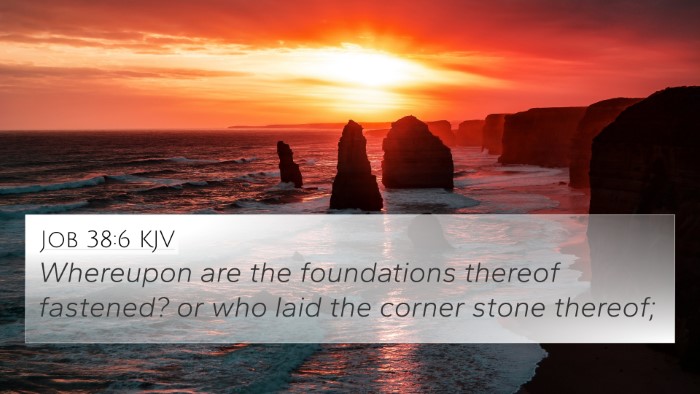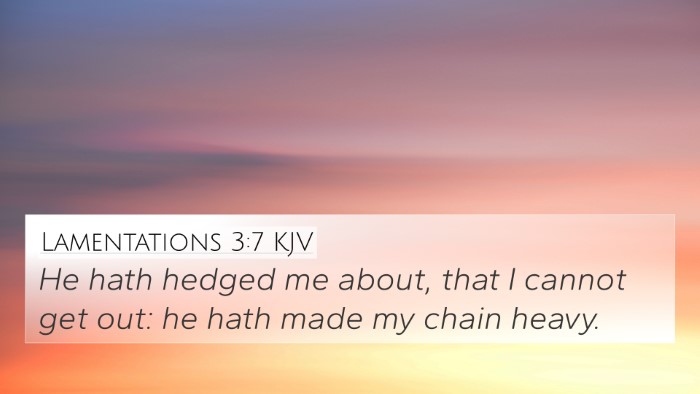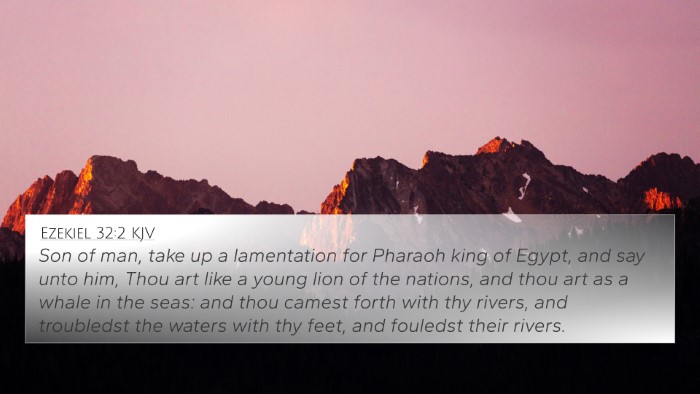Old Testament
Genesis Exodus Leviticus Numbers Deuteronomy Joshua Judges Ruth 1 Samuel 2 Samuel 1 Kings 2 Kings 1 Chronicles 2 Chronicles Ezra Nehemiah Esther Job Psalms Proverbs Ecclesiastes Song of Solomon Isaiah Jeremiah Lamentations Ezekiel Daniel Hosea Joel Amos Obadiah Jonah Micah Nahum Habakkuk Zephaniah Haggai Zechariah MalachiJob 7:12 Similar Verses
Job 7:12 Cross References
Am I a sea, or a whale, that thou settest a watch over me?
Uncover the Rich Themes and Topics of This Bible Verse
Listed below are the Bible themes associated with Job 7:12. We invite you to explore each theme to gain deeper insights into the Scriptures.
Job 7:12 Cross Reference Verses
This section features a detailed cross-reference designed to enrich your understanding of the Scriptures. Below, you will find carefully selected verses that echo the themes and teachings related to Job 7:12 KJV. Click on any image to explore detailed analyses of related Bible verses and uncover deeper theological insights.

Job 7:17 (KJV) »
What is man, that thou shouldest magnify him? and that thou shouldest set thine heart upon him?

Job 38:6 (KJV) »
Whereupon are the foundations thereof fastened? or who laid the corner stone thereof;

Job 41:1 (KJV) »
Canst thou draw out leviathan with an hook? or his tongue with a cord which thou lettest down?

Lamentations 3:7 (KJV) »
He hath hedged me about, that I cannot get out: he hath made my chain heavy.

Ezekiel 32:2 (KJV) »
Son of man, take up a lamentation for Pharaoh king of Egypt, and say unto him, Thou art like a young lion of the nations, and thou art as a whale in the seas: and thou camest forth with thy rivers, and troubledst the waters with thy feet, and fouledst their rivers.
Job 7:12 Verse Analysis and Similar Verses
Understanding Job 7:12
Job 7:12 states: "Am I a sea, or a whale, that thou settest a watch over me?" In this verse, Job expresses his feeling of being under constant scrutiny and pressure from God. This is part of his broader lament about suffering and the seeming absence of justice in his trials.
Summary of Interpretations
In examining this verse, we gather insights from various public domain commentaries:
- Matthew Henry: Henry emphasizes Job's deep sense of anguish and confusion over his suffering. He interprets Job's metaphorical question as a criticism of God’s watchfulness, suggesting that Job feels like he is being monitored like a wild beast rather than a beloved creation.
- Albert Barnes: Barnes notes that Job is lamenting his state of being tormented and pursued, akin to animals in the sea. He highlights the psychological turmoil Job faces as he questions the nature of God's oversight during his trials.
- Adam Clarke: Clarke suggests that this verse illustrates Job’s feeling of overwhelming loneliness and isolation. He points out that Job’s comparison with the sea reflects his feelings of being vast and tumultuous, hinting at the chaos in his life.
Deep Dive into Themes
The verse encapsulates several key themes relevant to a broader theological understanding:
- Suffering: Job's expression reveals a universal struggle with pain and suffering, making this verse relatable to anyone experiencing distress.
- Divine Oversight: The idea of God's watchfulness is central to this verse, prompting reflections on God’s role in human suffering.
- Isolation: Job’s rhetorical question emphasizes feelings of abandonment, inviting readers to explore the emotional aspects of despair.
Bible Verse Cross-References
Understanding Job 7:12 can be enriched by exploring the following cross-references, which highlight thematic parallels and connections between scriptures:
- Psalms 139:7-10: Reflects on God’s omnipresence and awareness, reinforcing the idea of divine observation.
- Proverbs 15:3: Enhances the reflection on God’s watchful nature and the way He observes human actions.
- Isaiah 40:12: Emphasizes God's greatness and power over creation, providing context to Job's feelings of insignificance.
- Hebrews 4:13: Affirms that all things are naked and open before God, linking to the theme of divine scrutiny.
- Matthew 10:29-31: Discusses God’s care even for the smallest creatures, contrasting with Job’s feeling of being overlooked.
- 1 Peter 5:7: Encourages believers to cast their anxieties on God, resonating with Job’s feelings of distress.
- Jeremiah 20:7: Displays a similar sense of persecution and being watched that Job experiences.
Connecting Themes through Cross-Referencing
By utilizing tools for Bible cross-referencing, one can uncover the intricate connections between Job 7:12 and other scriptures. Understanding these themes can provide a more profound insight into the human experience in relation to divine oversight.
How to Use Bible Cross-References
- Identify words and themes within Job 7:12.
- Research related verses using a Bible concordance.
- Compare and analyze the themes presented across different books of the Bible.
- Document your findings through a cross-reference Bible study.
Conclusion: The Importance of Inter-Biblical Dialogue
The insights gleaned from Job 7:12, alongside the mentioned cross-references, foster a deeper understanding of the Bible as a cohesive text. This inter-Biblical dialogue enriches both personal and communal study, emphasizing that the struggles depicted in Job’s plight are echoed in the experiences of many biblical figures. Engaging with these connections allows believers to discover hope, purpose, and the overarching care of God amidst trials.


